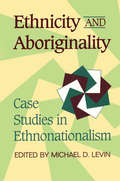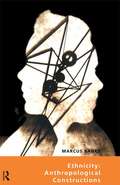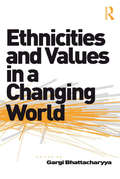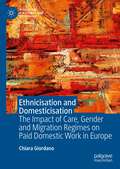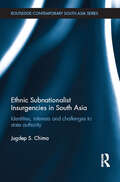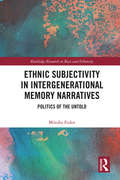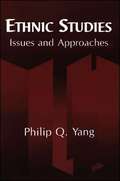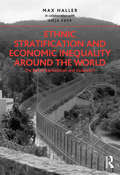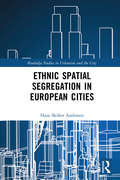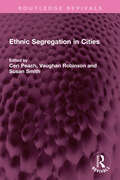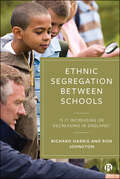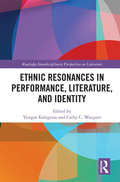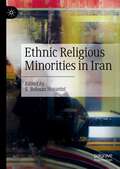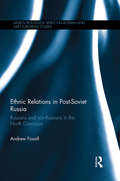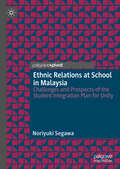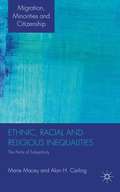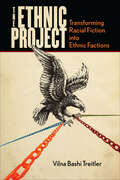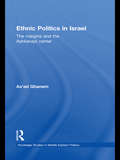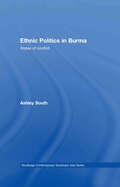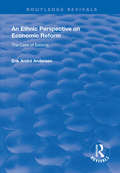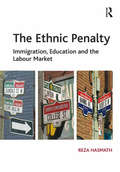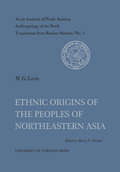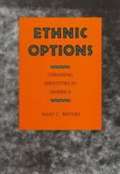- Table View
- List View
Ethnicity and Aboriginality
by Michael LevinEthnonationalism is a phenomenon of great importance in many parts of the world today. In this collection of papers, nine distinguished anthropologists focus on Canadian and international case studies to show how ethnonational claims of cultural groups have been expressed and developed in specific historical and political situations, from observations of Quebec to the former Soviet Union, through problems of the Australian aborigines, Malay identity, the Avaglogoli in Western Kenya, and ethnic cultures in Nigeria, the essays reflect the complexity of the claims and aspirations of different groups. Some deal with intractable demand for sovereignty, others with solutions that attempt to achieve a level of autonomy and recognition short of sovereignty.The intellectual history of the right of self-determination is little more than 200 years old. It is only since that time that the ideal of popular sovereignty by any group that views itself as a people became an accepted view. These writers have used a paper by Walker Connor, 'The Politics of Ethnonationalism' as a foil against which to develop their own theses. Connor argues that claims to self-determination based on ethnic identity present problems to all but a few states, and since these claims are unlikely to be satisfied, ethnonationalism is disruptive of political order. The papers in this volume do not accept his negative conclusions, although they share a sense of secession and division are less worthy outcomes than pluralist structures. Nevertheless, in Valery Tishkov's discussion of the former Soviet Union, secession appears to be the only solution. Since ethnonationalism will continue to be a political issue for some time, these papers form a significant base for future political debate.
Ethnicity: Anthropological Constructions
by Marcus BanksEthnicity has been a key concept in anthropology and sociology for many years, yet many people still seem uncertain as to its meaning, its relevance, and its relationship to other concepts such as `race' and nationalism. In Ethnicity: Anthropological Constructions the major anthropological and sociological approaches to ethnicity, covering much of the significant literature and leading authors, are outlined clearly and concisely.
Ethnicities and Values in a Changing World
by Gargi BhattacharyyaRecent debates about national identity, belonging and community cohesion can appear to suggest that ethnicity is a static entity and that ethnic difference is a source of conflict in itself - Ethnicities and Values in a Changing World presents an alternative account of ethnicity. This volume brings together an international team of leading scholars in the field of ethnic studies in order to examine innovative articulations of ethnicity and challenge the contention that ethnicity is static or that it necessarily represents traditional values and cultures. It will appeal not only to sociologists, but to anyone working in the fields of cultural studies, race and ethnicity, globalization, migration and anthropology.
Ethnicisation and Domesticisation: The Impact of Care, Gender and Migration Regimes on Paid Domestic Work in Europe (Migration, Diasporas and Citizenship)
by Chiara GiordanoThis book explores the interconnection of care, gender and migration regimes and their impact on ‘migrant domestic work’ in Europe, in a comparative perspective. The research presented in this book aims to understand the reasons not only of the increased concentration of migrants in the domestic and care sector, but also of the significant differences between European countries. Care, gender and migration regimes are first operationalised in the form of three typologies. Then, the three typologies are used to investigate the ethnicisation of the domestic sector (the proportion of migrants in the domestic sector, compared to natives) and the domesticisation of migrants (the proportion of migrants in the domestic sector, compared to other sectors). The findings suggest that the three regimes have an effect and that this effect is greater when they are taken into account simultaneously.
Ethnic Subnationalist Insurgencies in South Asia: Identities, Interests and Challenges to State Authority (Routledge Contemporary South Asia Series)
by Jugdep S. ChimaThis book provides a micro-historical analysis of the emergence and contemporary dynamics of recent ethnic sub-nationalist insurgencies in South Asia. Using comparative case studies, it discusses the causes of each insurgency, analyses the trajectory and dynamics of each including attempts at resolution, and highlights the wider theories of ethno-nationalist insurgency and mobilization. Bringing together an international group of contributors, the book covers insurgencies in India, Sri Lanka, Pakistan, Nepal, and Bangladesh. It questions why ethnic sub-nationalist insurgencies occurred at particular points in time and not at others, and explores the comparative trajectories of these movements. The book goes on to discern reappearing patterns of conflict escalation/de-escalation through the method of comparative process-tracing. It argues that while identity is a necessary factor for insurgency, it is not a sufficient one. Instead, ethnic mobilization and insurgency only emerge when it is activated by tension emerging from political competition between ethnic and central state elites. These elite-led dynamics, when combined with favourable socio-economic and political conditions, make the ethnic masses primed to accept the often symbolically-rich appeals from their leaders to mobilize against the central state. Providing an important study on ethno-nationalist insurgencies in South Asia, the book will be of interest to those working in the fields of South Asian Politics, Security Studies and Ethnic Conflict.
Ethnic Subjectivity in Intergenerational Memory Narratives: The Politics of the Untold (Routledge Research in Race and Ethnicity)
by Mónika FodorIn this interdisciplinary study, Mónika Fodor explores how intergenerational memory narratives embedded in the speaker's own stories impact ethnic subjectivity construction. Working with thematically selected life experiences from interviews conducted with second- and late-generation European-Americans, Fodor demonstrates how the storytellers position themselves in a range of social, cultural, and political discourses to claim or disclaim ethnicity as part of their subjectivity. Tying narrative content, structural, and performance analysis to the sociological and sociolinguistic concepts of "symbolic capital" and "investment," Fodor unpacks the changing levels of identifying with one’s ancestral ethnic heritage and its potential to carry meaning for late-generation descendants. In doing so, she reveals the shared features of identification among individuals through narrative meaning-making, which may be the basis of real or imagined, heterolocal discourse community formation and sustained ethnic subjectivity. The narrative analysis demonstrates how the cohesive force among members of the community is the shared knowledge of story frames and the personalized retelling of these. Ethnic Subjectivity in Intergenerational Memory Narratives draws on inherited, often moving, personal experiences that offers new insights into the so far largely unexplored terrain of the narrative structure of intergenerationally transferred memory retellings, that will be of great interest to students and scholars of ethnic studies, migration and identity studies.
Ethnic Studies: Issues and Approaches
by Philip Q. YangExploring major issues in ethnic studies with theoretical and methodological approaches.
Ethnic Struggle, Coexistence, and Democratization in Eastern Europe
by Sherrill StroscheinIn societies divided on ethnic and religious lines, problems of democracy are magnified – particularly where groups are mobilized into parties. With the principle of majority rule, minorities should be less willing to endorse democratic institutions where their parties persistently lose elections. While such problems should also hamper transitions to democracy, several diverse Eastern European states have formed democracies even under these conditions. In this book, Sherrill Stroschein argues that sustained protest and contention by ethnic Hungarians in Romania and Slovakia brought concessions on policies that they could not achieve through the ballot box, in contrast to Transcarpathia, Ukraine. In Romania and Slovakia, contention during the 1990s made each group accustomed to each other's claims and aware of the degree to which each could push its own. Ethnic contention became a de facto deliberative process that fostered a moderation of group stances, allowing democratic consolidation to slowly and organically take root.
Ethnic Stratification and Economic Inequality around the World: The End of Exploitation and Exclusion?
by Max Haller collaboration Anja EderThe modern world is characterised by pervasive economic inequalities. Strong economic growth in some developing countries has contributed to a degree to a reduction in the levels of inequality between nations, yet inequality within nations remains high and in some cases, continues to increase. Ethnic Stratification and Economic Inequality around the World investigates the reasons for these striking differences, exploring the coincidence and interaction between economic stratification and ethnic differentiation. Drawing on extensive international survey and statistical data, the author develops a new theory and concrete hypotheses concerning the conditions which lead toward extreme inequality and those which tend toward greater equality. A systematic examination of the interaction between class structures, social stratification and ethnic differentiation, this book sheds light on the manner in which the resulting social structures produce different levels of economic inequality, offering a fivefold typology of patterns of ethnic stratification, which can be applied to present-day world regions. Drawing on the work of Max Weber to provide a rigorous investigation of inequality around the world, it demonstrates what 'sociology as a science of social reality' can significantly contribute to our understanding of global economic stratification. The book is relevant for a wide social-scientific audience, particularly for sociologists, economists and political scientists working in a comparative perspective.
Ethnic Spatial Segregation in European Cities (Routledge Studies in Urbanism and the City)
by Hans Skifter AndersenThis book provides the first in depth interpretation of how to understand the causes of ethnic residential segregation across Western European countries and the USA. In many countries, ethnic minorities have obtained low quality housing and may be concentrated in certain parts of cities. This book asks to what extent ethnic segregation can be assigned to special preferences for housing and neighbourhoods among ethnic minorities. Is it the behaviour of the native majority, or is it a result of housing and urban policies? Ethnic segregation differs greatly across European countries and cities. Chapters discuss the extent to which these differences can be explained by welfare state systems, levels of immigration and the ethnic composition of minorities. The book also considers the impact of housing policy and the spatial structure of urban housing markets created by urban planning and policies. This book will appeal to teachers, students and researchers working with segregation, urban sociology and geography. It will also be valuable to civil servants in central and local governments who are working with measures to combat ethnic segregation and its consequences.
Ethnic Segregation in Cities (Routledge Revivals)
by Ceri Peach Vaughan Robinson Susan SmithFirst published in 1981, Ethnic Segregation in Cities argues that race and ethnicity are fundamental to writing about the city, and that economic patterns adapt themselves to race and ethnicity rather than vice versa. The problem of ethnic segregation is a burning one for both geographers and sociologists – geographers because of the concern for all aspects of urban deprivation, and sociologists because they are discovering that space and spatial processes are important factors in influencing social segregation or assimilation. The book brings together some of the main contributors to the literature on spatial aspects of ethnicity from both sides of the Atlantic. A variety of evidence from New York, Detroit, Bradford and Blackburn address the question of whether choice on the path of ethnic members, or constraints imposed by the host society are determinant factors influencing residential segregation. This book will be of interest to students of sociology, human geography and urban studies.
Ethnic Segregation Between Schools: Is It Increasing or Decreasing in England?
by Richard Harris Ron JohnstonThere is an enduring belief amongst some that segregation is worsening and undermining social cohesion, and that this is especially visible in the growing divides between the schools in which our children are educated. This book uses up-to-date evidence to interrogate some of the controversial claims made by the 2016 Casey Review, providing an analysis of contemporary patterns of ethnic, residential and social segregation, and looking at the ways that these changing geographies interact with each other.
Ethnic Resonances in Performance, Literature, and Identity (Routledge Interdisciplinary Perspectives on Literature)
by Yiorgos Kalogeras Cathy C. WaegnerThis volume seeks to weave applications of the dynamic concept of resonance to ethnic studies. Resonance refers to the ever broadening, multidirectional effects of movement or action, a concept significant for many disciplines. The individual chapters exchange the concept of static "intertextuality" for that of interactive "resonance," which encourages consideration of the mutual and processual influences among readings, paradigms, and social engagement in cultural analysis. International scholars of literary and cultural studies, linguistics, history, politics, or ethno-environmental studies contribute their work in this volume. Each chapter examines a specific ethnic phenomenon in terms of relevant literature, lived experience and theoretical approaches, or historical intervention, relating the given case study to parameters of resonance. The book offers dialogic transnational interchange, a play of eclectic ethnic voices, inquiries, perspectives, and differences. The studies in this interdisciplinary volume show that – through resonant engagement with(in) and between works – literary production can both enhance and disturb cultural narratives of ethnicity.
Ethnic Religious Minorities in Iran
by S. Behnaz HosseiniThis book explores the experiences of the ethnic and religious minorities of Iran, such as Jews, Yarsani, Christian, Sabean Mandaean, Bahai, Zoroastrian, Baluch, Kurd, and others and provides a historical overview of their position in society before and after the 1979 Islamic revolution and highlights their contribution to the country's history, diversity, and development. It also focuses on the historical, sociopolitical, and economic factors that affected the minorities' development during the last century. Author Behnaz Hosseini has shaped this book with authentic material and has assembled the experiences and opinions of academics of diverse backgrounds who approach the minorities’ issues in Iran in a constructive and ingenious way: from debating their efforts to preserve their identity and cultural heritage and ensure their survival to discussing their relations with the majority and other minorities, the role of religion in everyday life, and their contribution to the rich cultural history of Iran.
Ethnic Relations in Post-Soviet Russia: Russians and Non-Russians in the North Caucasus (BASEES/Routledge Series on Russian and East European Studies)
by Andrew FoxallWhile the collapse of communism in Russia was relatively peaceful, ethnic relations have been deteriorating since then. This deterioration poses a threat to the functioning of the Russian state and is a major obstacle to its future development. Analysing ethnic relations in the North Caucasus, this book demonstrates how a myriad of processes that characterised post-Soviet transition, including demographic change, economic upheaval, geopolitical instability, and political re-structuring, have affected daily life for citizens. It raises important questions about ethnicity, identity, nationalism, sovereignty, and territoriality in the post-Soviet space.
Ethnic Relations at School in Malaysia: Challenges and Prospects of the Student Integration Plan for Unity
by Noriyuki SegawaThis book considers the impact of the Rancangan Integrasi Murid Untuk Parpaduan (RIMUP: Student Integration Plan for Unity), the program developed as a driver towards Malaysian national integration and intended to promote an ideal of ‘unity in diversity’ through enhancing ethnic interaction in primary schools. Based on interview research with government departments, NGOs, and stakeholders at primary schools, this book highlights three main structural challenges to success of the RIMUP: the government’s weak management; the short duration and low frequency of an activity; and low student participation rate. The book also provides concrete suggestions to develop the RIMUP, to improve ethnic relations and to shape the future direction of education policies for the development of national integration, making a significant contribution to Malaysian studies as well as education policy in multi-ethnic countries.
Ethnic, Racial and Religious Inequalities
by Marie Macey Alan CarlingThis book challenges some of the most basic assumptions underpinning the growing interest in religion, including: that religion is increasing and secularisation is decreasing and that religion is the main component of identity for all minority ethnic people.
The Ethnic Project: Transforming Racial Fiction into Ethnic Factions (Stanford Studies In Comparative Race And Ser.)
by Vilna Bashi TreitlerRace is a known fiction--there is no genetic marker that indicates someones race--yet the social stigma of race endures. In the United States, ethnicity is often positioned as a counterweight to race, and we celebrate our various hyphenated-American identities. But Vilna Bashi Treitler argues that we do so at a high cost: ethnic thinking simply perpetuates an underlying racism. In "The Ethnic Project," Bashi Treitler considers the ethnic history of the United States from the arrival of the English in North America through to the present day. Tracing the histories of immigrant and indigenous groups--Irish, Chinese, Italians, Jews, Native Americans, Mexicans, Afro-Caribbeans, and African Americans--she shows how each negotiates Americas racial hierarchy, aiming to distance themselves from the bottom and align with the groups already at the top. But in pursuing these "ethnic projects" these groups implicitly accept and perpetuate a racial hierarchy, shoring up rather than dismantling race and racism. Ultimately, "The Ethnic Project" shows how dangerous ethnic thinking can be in a society that has not let go of racial thinking.
Ethnic Politics in Israel: The Margins and the Ashkenazi Centre (Routledge Studies in Middle Eastern Politics)
by As'ad GhanemThis book offers an analysis on contemporary Israeli democracy, examining in particular society and politics from the perspectives of the different ethnic groups outside of the Ashkenazi mainstream. The book explores the political expressions of the secondary groups in Israel (Mizrahim, Religious, Russians and Palestinian-Arab) and how these groups where treated by the Ashkinazim as a threat to its hegemony over the state. Looking at the instability created by the struggle of these marginal groups against the state, and the discrimination policy practiced by the Ashkenazi 'hegemonic ethnic state' regime against the other, non-Ashkenazi, groups, the book illustrates how this has contributed to the failure to establish an ‘Israeli people’. Ethnic Politics in Israel will be of great interest to students and researchers in the fields of Middle East, Palestinian, Arab, Jewish and Israeli studies, political science, sociology and psychology.
Ethnic Politics in Burma: States of Conflict (Routledge Contemporary Southeast Asia Series)
by Ashley SouthThis book examines the ideas which have structured half a century of civil war in Burma, and the roles which political elites and foreign networks - from colonial missionaries to aid worker activists - have played in mediating understandings of ethnic conflict in the country. The book includes a brief overview of precolonial and colonial Burma, and the emergence ethnic identity as a politically salient characteristic. It describes the struggle for independence and the parliamentary era (1948-62), and the quarter century of military-socialist rule that followed (1962-88). The book analyses the causes, dynamics and impacts of on-going armed conflict in Burma, since the 1988 'democracy uprising' through to the 2007 'saffron revolution' (when monks and ordinary people took to the streets in protest against the military regime). There is a special focus on the plight of displaced people, and the ways in which local and international agencies have responded. The book also examines one of the most significant, but least well-understood, political developments in Burma over the last twenty years: the series of ceasefires agreed since 1989 between the military government and most armed ethnic groups. The positive and negative impacts of the ceasefires are analysed, including a study of civil society among ethnic nationality communities. This analysis leads to a discussion of the nature of social and political change in Burma, and a re-examination of some commonly held assumptions regarding the country, including issues of ethnicity and federalism. The book concludes with a brief Epilogue, taking account of Cyclone Nargis, which struck Burma on 2 and 3 May 2008, resulting in a massive humanitarian crisis.
An Ethnic Perspective on Economic Reform: Case of Estonia (Routledge Revivals)
by Erik Andre AndersenFirst published in 1999, this book has its main emphasis on the consequences of privatisation for the Russian population in Estonia, The Book will attempt to answer the following questions by comparing the Estonians and the Russians.The process of restoration of the Republic of Estonia (which began to move fast in the late 1980’s and culminated with the declaration of national independence in 1991) is seen as an important political factor behind the economic reform in Estonia. This reform during the transition period is generally considered to be among the most successful in eastern Europe.
The Ethnic Penalty: Immigration, Education and the Labour Market (Research In Migration And Ethnic Relations Ser.)
by Reza HasmathPopulations of visible ethnic minorities have steadily increased over the past few decades in immigrant-receptive societies. While a complex calculus of push and pull factors has motivated this increase, one of the main impetuses for this migration has been the search for employment, better wages and a higher standard of living. It is therefore not surprising that the educational attainments of the first generation and beyond have achieved convergence with, or exceeded the non-ethnic minority cohort. These outcomes may suggest a greater propensity for visible ethnic minorities to attain labour market success and to fully integrate within the community. However, the narrative derived from statistical analysis, interviews and participant observation suggest an uneasiness boldly to claim this as the most convincing conclusion at this juncture. The Ethnic Penalty argues that a penalty has impeded the occupational success of ethnic minorities during the job search, hiring and promotion process. As a result, ethnic minorities have a lower income, higher unemployment and a general failure to convert their high educational attainments into comparable occupational outcomes. In this context, the book examines whether explanatory factors such as discrimination, an individual's social network, a firm's working culture, and a community's social trust are major contributing reasons behind this apparent penalty, whilst also making suggestions for improving the integration, education delivery, and labour market outcomes of visible ethnic minorities.
Ethnic Origins of the Peoples of Northeastern Asia No. 3
by Henry Michael Maksim LevinThis is a translation from a Russian work published in 1958, one of the major works of a well-known and prolific writer. It deals with the origins of the small nations and peoples of central Siberia and northeastern Asia. Many guesses have been made about these peoples but most have not been substantiated, because of the lack of field work or because the materials on them had not been analysed and published. Levin has reviewed the old materials, gathered and analysed hitherto unpublished ones, and personally surveyed many of the peoples as a member of the Russian Northeastern Expedition. He makes use of all the data of physical anthropology, ethnography, archaeology, and linguistics on the peoples he describes and has thus provided a definitive work on a nearly forgotten segment of mankind inhabiting an extensive territory. Volume III in the series Anthropology of the North: Translations from Russian Sources sponsored by the Arctic Institute of North America and under the general editorship of H.N. Michael, Temple University.
Ethnic Options: Choosing Identities In America
by Mary C. WatersIn this perceptive and revealing study, Mary Waters explores the "reinvention" of ethnicity in the lives of the grandchildren and great grandchildren of European immigrants, asking how their ethnic heritage is lived, maintained, and celebrated. Through in-depth interviews with sixty third and fourth generation white ethnics in suburban California and Pennsylvania, the author discovers a surprisingly resilient sense of ethnicity among people who could reasonably label themselves simply "American. " Mary Waters' research brings to light a fascinating history of American immigration, revealing aspects of a shared culture and ideology and the unique ways in which ethnic identities fulfill very American needs. Describing the "symbolic ethnicity" of later generation white ethnics as a quintessential American phenomenon, she argues that ethnicity has retained its importance in our lives precisely because it allows people to reconcile the contradictory American values of choice, individuality, and community. In addition to her exploration of the symbolic ethnicity of later generation middle-class whites, Mary Waters addresses its cost to society, contrasting it with the optionless ethnicity of non-white Americans. Her conclusions in Ethnic Options constitute an invaluable contribution to our understanding of contemporary American life.
Ethnic Oasis: The Chinese in the Black Hills
by Liping Zhu Rose Estep Foshahe discovery of gold in the Black Hills of South Dakota brought thousands of people to the mining town of Deadwood, including many Chinese immigrants. Ethnic Oasis explores how the Chinese met the challenge of living and working in a land much different from their own. Seeking to surround themselves with the familiar, they established their own "Chinatowns" in Deadwood and other communities throughout the West. From these enclaves, the Chinese competed to succeed in American society. Through diligence and an ability to work within the social and legal systems, many thrived and became respected members of what had been a hostile community. Ethnic Oasis presents the history and archaeology of the Chinese experience in the Black Hills and elsewhere in the West.
